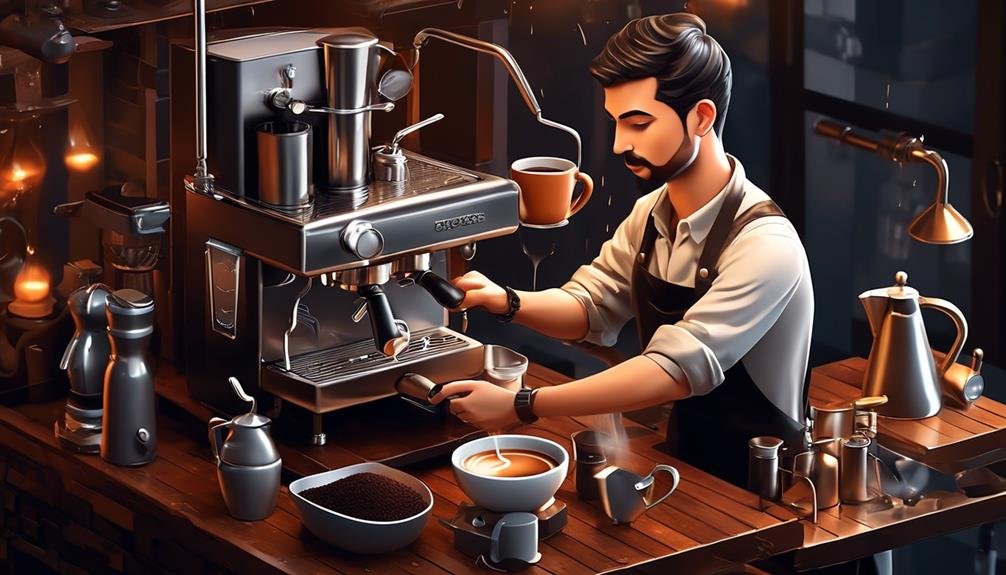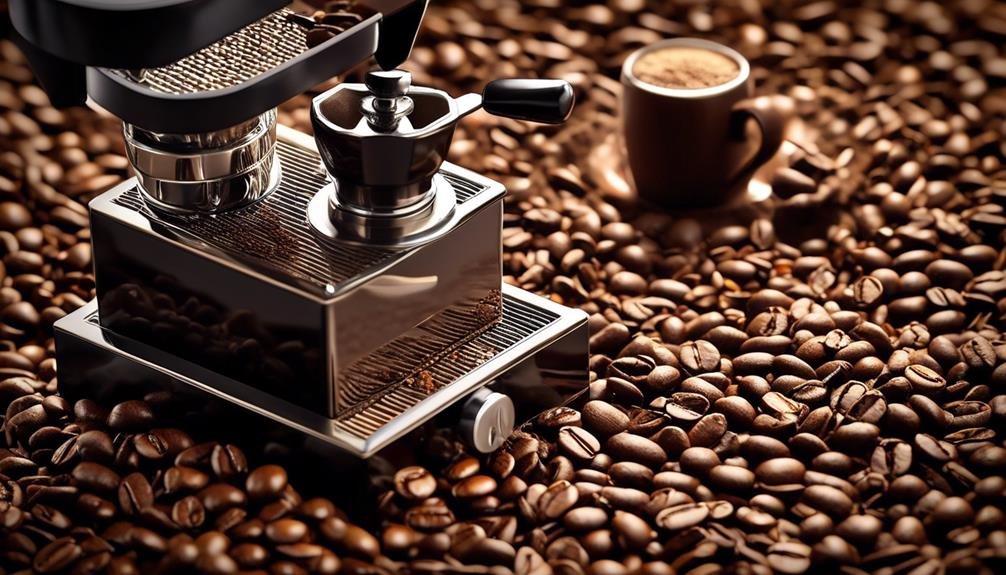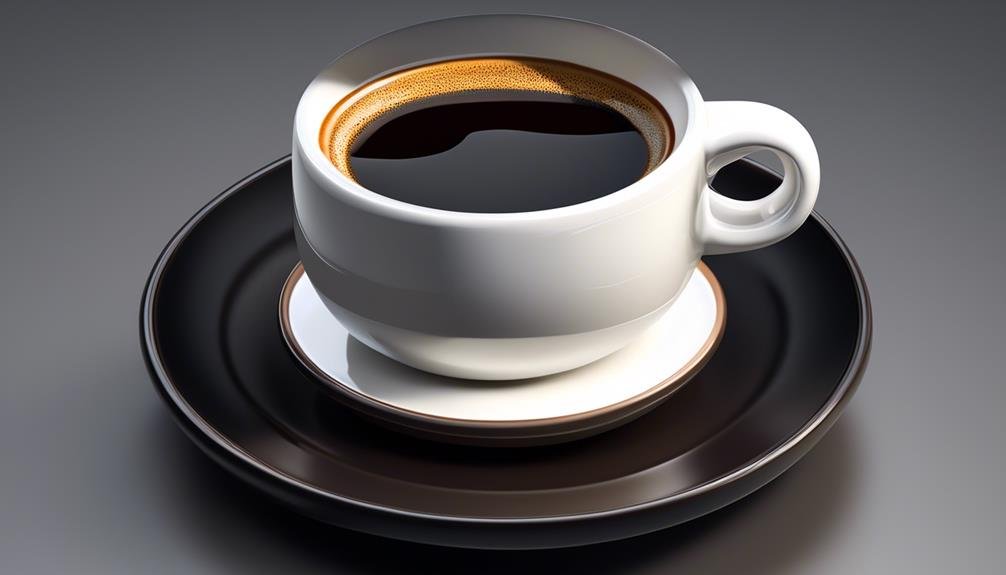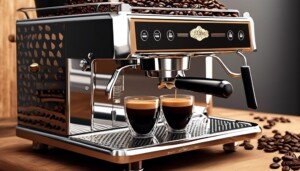Are you tired of that bitter taste that lingers in your mouth after sipping on a cup of espresso? Well, you're not alone. Many coffee enthusiasts find themselves wondering what causes this unpleasant bitterness in their beloved beverage.
While there could be several factors at play, one of the main culprits is over-extraction. But what exactly does that mean, and how can you avoid it?
Stay tuned as we explore the fascinating world of espresso brewing and uncover the secrets behind that bitter taste.
Key Takeaways
- The quality of beans and grind size significantly impact the taste of espresso.
- Over-extraction can lead to a bitter taste, while under-extraction can result in a sour taste.
- Consistency in the brewing process, including grind size, water temperature, and extraction time, is crucial for a well-balanced flavor profile.
- Using fresh and high-quality beans is essential to avoid bitterness in espresso.
Coffee Bean Selection
When selecting coffee beans for your espresso, it's important to consider the specific grinder settings that will yield the optimal results for each type of bean. The taste of your espresso relies heavily on the quality of the beans and the grind size.
Different beans require different grinder settings to achieve the desired taste profile. The bitterness in espresso can be caused by several factors, including over-extraction or improper grind size. To avoid a bitter taste, start by choosing high-quality beans that are suited for espresso. Balanced blends, such as Tonys Crew Brew, are often recommended for learning how to dial in the grinder settings.
Experiment with different grind sizes to find the sweet spot that produces a balanced and flavorful shot. It's important to note that the roast level of the beans also plays a role in the taste. Lighter roasts tend to have brighter and more acidic flavors, while darker roasts can be more bitter.
Additionally, ensure that your espresso machine is properly maintained and that the water temperature and pressure are within the recommended range. With practice and experience, you'll improve the dialing-in process and achieve the perfect tasting shot of espresso.
Brewing Methods
To ensure a well-balanced and flavorful shot of espresso, it's essential to understand the different brewing methods available. The brewing method you choose can greatly impact the taste of your espresso.
One important factor to consider is the grind size of the coffee. Finer grounds generally result in a more intense and bitter taste, while coarser grounds can produce a weaker and less flavorful shot.
Another crucial aspect is the water temperature. Water that's too hot can lead to over-extraction and bitterness, while water that's too cold may result in under-extraction and a sour taste.
The shot time, or the amount of time it takes for the water to pass through the coffee grounds, also plays a role in the final flavor. A longer shot time can lead to over-extraction and bitterness, while a shorter shot time may result in an under-extracted and weak taste.
The amount of water used and the brew ratio, which is the ratio of ground coffee to water, should also be considered.
Experimenting with different brewing methods and adjusting these variables can help you achieve the desired flavor profile for your espresso.
Over Extraction

Over-extraction in espresso shots results in a bitter taste caused by the excessive bonding of water with the coffee. When water spends too much time in contact with the coffee grounds, it extracts more compounds, including bitter ones, resulting in a less desirable taste. This can occur due to various factors, such as poor flow through the espresso puck, fine and restrictive grounds, tight tamping, and high water temperatures.
To avoid over-extraction and the associated bitter taste, it's important to pay attention to the grind setting and brew time. Dark roasted beans, which are already more prone to bitterness, may require a coarser grind setting to prevent over-extraction. Additionally, adjusting the brew time to fall within the recommended range of 20-30 seconds can help mitigate any potential issues.
If you find that your espresso shots taste bitter, it's essential to evaluate the variables that may contribute to over-extraction. Check your water temperature, ensure proper tamping technique, and consider slightly adjusting your grinder settings to a coarser setting. By making these adjustments, you can dial in the extraction process and achieve a balanced, flavorful espresso shot without the unpleasant bitterness.
Brew Ratio
To ensure a balanced and flavorful espresso shot that avoids the bitterness caused by over-extraction, it's crucial to understand and control the brew ratio. The brew ratio refers to the ratio of coffee to water used in making espresso. By adjusting this ratio, you can control the strength and flavor of your espresso.
Here are some key points to keep in mind about brew ratio:
- The recommended espresso brew ratio is typically 1:2, which means using 1 part coffee to 2 parts water. This ratio helps achieve a well-extracted espresso without overpowering flavors.
- Adjusting the brew ratio can help balance the extraction of flavors from the coffee grounds. If your espresso tastes bitter, try using a slightly coarser grind or using a higher coffee to water ratio to reduce the extraction.
- The type of coffee beans used can also affect the brew ratio. Medium roast coffee beans tend to work well with the 1:2 brew ratio, but you can experiment with different ratios based on your preference and the specific beans you're using.
- It's important to note that the brew ratio is just one factor in achieving a balanced espresso shot. Factors such as the quality of your coffee machine, the distribution of the coffee puck, and the consistency of your espresso machine also play a role in the final taste.
To avoid a bitter tasting espresso, be mindful of your brew ratio and adjust your brew accordingly. Experiment with different ratios and techniques to find the perfect balance of flavors that suits your taste.
Grind Size

Grind size plays a crucial role in the taste and quality of your espresso shots. It refers to the size of the coffee grounds used for brewing. When it comes to espresso, finding the right grind size is essential for achieving the desired flavor profile.
A finer grind size leads to a faster pour and under-extraction, resulting in a sour taste in your espresso shot. On the other hand, a coarser grind size leads to a slower pour and can produce a stronger flavor, but only up to a certain point. If the grind size is too coarse, the extraction will be uneven, resulting in a weak and watery coffee taste.
To achieve the best results, the recommended espresso pour time falls between 25-35 seconds, with the sweet spot typically within 27-33 seconds. This range allows for proper extraction of the coffee's flavors without over-extracting bitter compounds.
The ideal grind size depends on various factors, including the type of coffee beans used. Specialty Arabica coffee tends to require a finer grind, while Robusta beans may need a coarser grind to balance their higher bitterness levels.
Finding the right grind size for your espresso shot may require some practice and experimentation. Remember, a well-executed extraction will result in a delicious, well-balanced espresso shot, while an incorrect grind size can contribute to a bitter, burnt coffee taste.
Using Bad Coffee
When it comes to achieving the perfect espresso shot, one factor that can greatly affect the taste is the quality of the coffee beans used. Using bad coffee can result in a bitter-tasting espresso that's far from enjoyable. Here are some reasons why using bad coffee can lead to a bitter espresso:
- Poor quality beans: Using low-quality beans that are stale or poorly roasted can contribute to a bitter taste in your espresso. It's essential to choose beans that are fresh and have been roasted properly to achieve a flavorful shot.
- Inadequate water quality: Water plays a crucial role in the extraction process, and using low-quality or poorly filtered water can negatively impact the taste of your espresso. It's important to use clean, filtered water to ensure a balanced and smooth extraction.
- Improper grind size: Using the wrong grind size for your espresso can result in over-extraction, leading to a bitter taste. It's crucial to adjust the grind size according to the beans you're using to achieve the correct extraction time and avoid bitterness.
- Lack of consistency: Inconsistency in your brewing process, such as inconsistent tamping or uneven distribution of coffee grounds, can contribute to bitterness in your espresso. It's essential to maintain consistency in every step, from grinding to extraction, to achieve a well-balanced and flavorful shot.
Frequently Asked Questions
Why Does My Espresso Taste Bitter?
Your espresso tastes bitter because of factors like over-extraction and dirty equipment. Adjusting grinder settings, checking water temperature, and practicing proper tamping technique can help fix this issue. Regular maintenance is crucial to prevent bitterness.
Why Does My Coffee Taste Bitter All of a Sudden?
Your sudden bitter coffee taste may be due to factors like over-extraction, incorrect water temperature, or improper tamping technique. Adjust grinder settings, check water temperature, and ensure correct tamping to fix the bitterness.
Why Is My Espresso Sour With Bitter Aftertaste?
To fix your espresso's sour taste and bitter aftertaste, make sure to adjust your grinder settings, check water temperature, and tamp properly. These factors can help prevent over-extraction, which causes bitterness in shots.
How Do You Fix Bitter Taste in Coffee?
To fix a bitter taste in your espresso, adjust the water temperature, tamping technique, and grinder settings. Aim for a shot time of 20-30 seconds. Regular cleaning and maintenance of your equipment is also crucial to prevent bitterness.
Conclusion
In conclusion, bitter tasting espresso can be caused by over-extraction, which occurs when water bonds too much with the coffee. Factors such as poor flow, fine grounds, tight tamping, and high water temperatures contribute to this issue.
To prevent bitterness, it's important to adjust grinder settings, tamp properly, and aim for a shot time of 20-30 seconds. Regular cleaning and maintenance of equipment also help avoid flavor issues caused by dirty equipment and mineral buildup.




